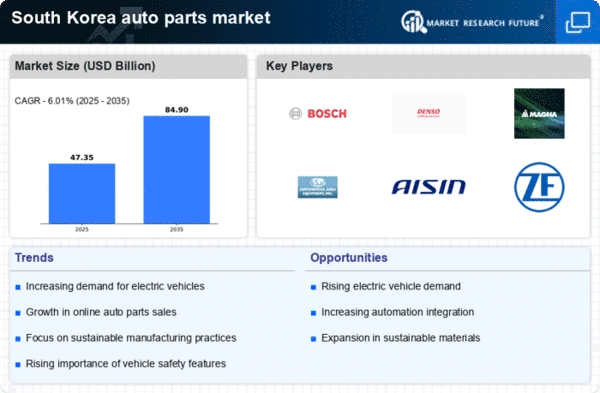Growth of E-Commerce Platforms
The growth of e-commerce platforms is transforming the auto parts market in South Korea. With the increasing penetration of the internet and mobile devices, consumers are increasingly turning to online channels for purchasing auto parts. This shift is driven by the convenience of online shopping, competitive pricing, and the availability of a wide range of products. E-commerce sales in the auto parts market are projected to account for over 30% of total sales by 2026, indicating a significant trend towards digitalization. As a result, traditional retailers are adapting their strategies to include online sales, thereby enhancing their reach and customer engagement in the auto parts market.
Increasing Vehicle Ownership Rates
The rising vehicle ownership rates in South Korea are a key driver of the auto parts market. As more individuals acquire vehicles, the demand for replacement parts and maintenance services is expected to surge. Current statistics indicate that vehicle ownership has increased by approximately 5% annually, leading to a growing need for auto parts. This trend is particularly pronounced in urban areas, where the convenience of personal transportation is highly valued. Consequently, manufacturers and suppliers are likely to benefit from this increasing demand, as they expand their offerings to meet the needs of a larger customer base in the auto parts market.
Rising Demand for Vehicle Customization
The auto parts market in South Korea experiences a notable increase in demand for vehicle customization. Consumers are increasingly seeking personalized features and enhancements, which drives the need for a diverse range of aftermarket parts. This trend is particularly evident among younger demographics who prioritize individuality in their vehicles. The customization segment is projected to grow at a CAGR of approximately 7% over the next five years, which indicates robust market potential. As a result, manufacturers are expanding their product lines to cater to this demand, thereby enhancing their competitive edge in the auto parts market. Furthermore, the rise of social media platforms has facilitated the sharing of customized vehicles, further fueling consumer interest and driving sales in the auto parts market.
Technological Advancements in Manufacturing
Technological advancements play a crucial role in shaping the auto parts market in South Korea. Innovations such as 3D printing and automation are revolutionizing the production processes, leading to increased efficiency and reduced costs. For instance, 3D printing allows for rapid prototyping and the creation of complex parts that were previously difficult to manufacture. This not only shortens lead times but also enables manufacturers to respond swiftly to market demands. The integration of smart manufacturing technologies is expected to enhance productivity by up to 20% in the coming years. Consequently, these advancements are likely to attract investments and foster growth within the auto parts market, as companies strive to remain competitive in an evolving landscape.
Sustainability Initiatives and Eco-Friendly Products
Sustainability initiatives are becoming increasingly prominent within the auto parts market in South Korea. As environmental concerns rise, consumers are gravitating towards eco-friendly products and sustainable practices. Manufacturers are responding by developing parts made from recycled materials and implementing greener production methods. This shift is not only beneficial for the environment but also aligns with the growing consumer preference for sustainable options. Reports indicate that the market for eco-friendly auto parts could expand by 15% over the next five years, reflecting a significant opportunity for businesses. By prioritizing sustainability, companies can enhance their brand image and appeal to a broader customer base in the auto parts market.






















Leave a Comment